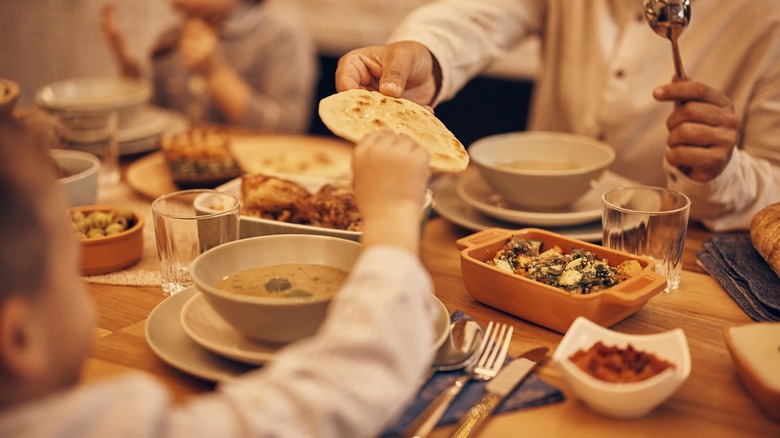The Order You Eat Your Food Could Prevent Your Blood Sugar From Spiking
If you don't have diabetes, you might not think too hard about managing your blood sugar. But if you've ever consumed a lot of food containing carbohydrates and then felt tired, nauseous, or extra thirsty, you might have been experiencing a blood sugar spike, according to Verywell Health.
It's normal for our blood sugar to fluctuate throughout the day. It goes up after a meal but is brought back down by insulin, the hormone responsible for letting sugar into the body's cells to use for fuel. However, we can experience blood sugar spikes if we consume lots of foods high in simple carbohydrates, like soda, desserts, bread, and pasta. It can also happen if we eat too much, don't exercise enough, are stressed out, or are dehydrated.
Having high blood sugar is associated with diabetes and prediabetes, which affects 13% and 34.5% of the U.S. population, respectively (per Healthline). So keeping an eye on blood sugar levels is wise in order to help prevent these conditions. Even if you don't have diabetes, however, you can still have blood sugar spikes if you eat too many simple sugars. This can leave you feeling lethargic and hungry after meals, according to Healthline.
It's not just about what we eat, though. Science now tells us that, in addition to the types of food we eat, the order we eat our food is important, too.
Eating carbs last can help prevent blood sugar spikes
According to a study published in Diabetes Care, consuming foods in the right order can help reduce the risk of a blood sugar spike. The study included 11 participants with type 2 diabetes who ate two meals on separate days after 12-hour overnight fasts. After each meal, their blood sugar was tested at 30, 60, and 120 minutes.
In the first meal, they ate carbohydrates first, followed by protein and then vegetables. In the second meal, one week later, they reversed this order. The researchers found that when protein and vegetables were consumed before carbohydrates, the post-meal blood glucose levels were much lower. The effects were comparable to drugs formulated to target blood sugar balance.
Biochemist Jessie Inchauspe, author of "Glucose Revolution: The Life-Changing Power of Balancing Your Blood Sugar," told MindBodyGreen that the ideal order to eat your meal is: vegetables, followed by protein and fat, leaving starches and sugar for last. She also recommends being wary of restaurants that serve complimentary bread before the meal, as consuming bread on an empty stomach could cause a blood sugar spike. By the time you get to your meal, you could be in the midst of a blood sugar crash that could lead to cravings and actually eating more, she explains.


